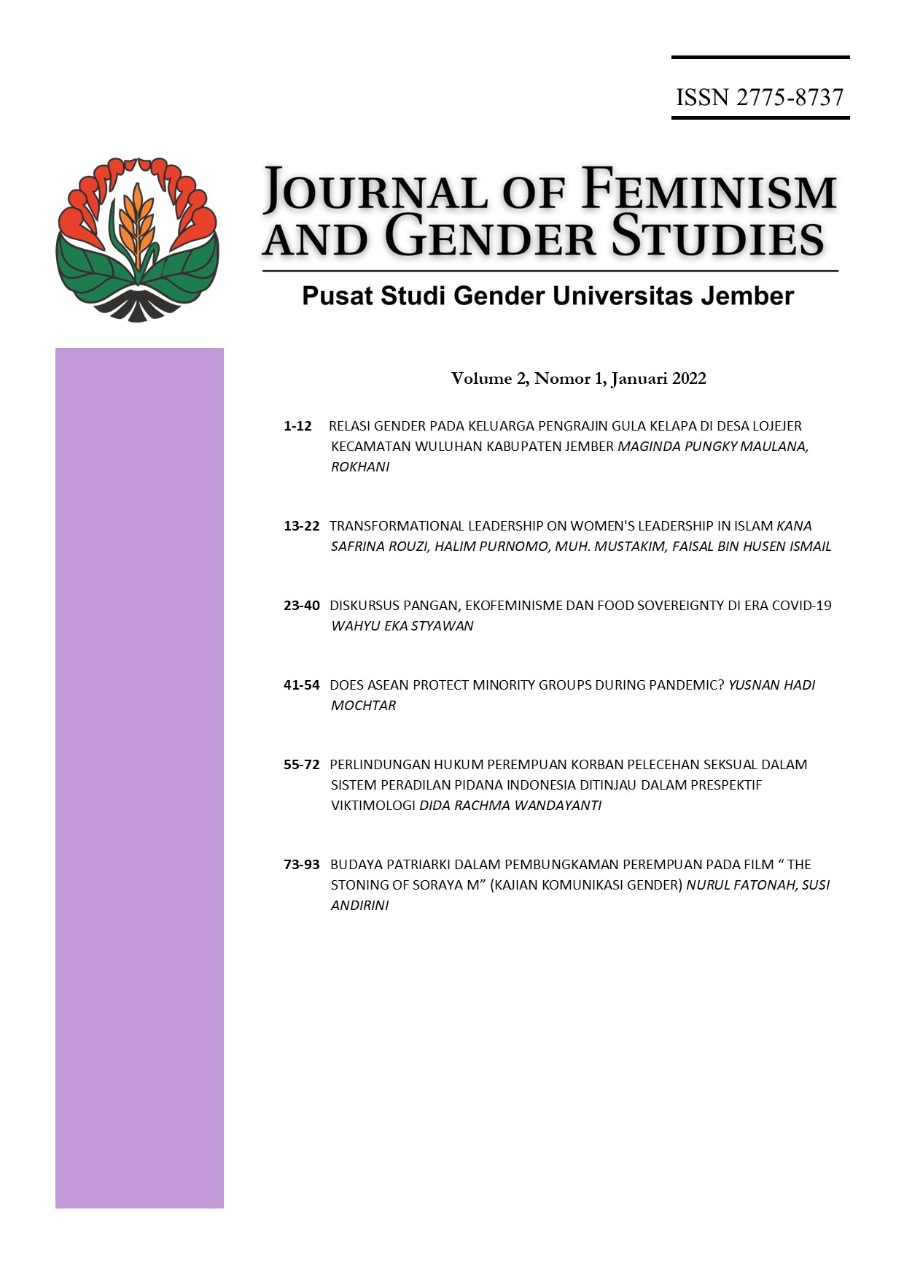Diskursus Pangan, Ekofeminisme dan Food Sovereignty di Era COVID-19
DOI:
https://doi.org/10.19184/jfgs.v2i1.29184Keywords:
Food Sovereignty, ecofeminism, food security, ecologyAbstract
During the COVID-19 pandemic, many sectors experienced shocks, not the food sector. In the food sector, there are still many problems facing difficulties from the presence of the COVID-19 wave. Some of the contributing factors are the transformation of agriculture from traditional to modern. Since the introduction of the green revolution, food has led to an intensification framework ranging from global agricultural food production and a focus on productivity, such as requiring farmers to grow monocultures. This condition causes land degradation, environmental degradation and biodiversity so that in the long term food security is threatened. Quantity-based intensification also causes local wisdom of farmers' agriculture, such as farmers' attachment to the ecosystem, the ability to produce local seeds, and the determination of subsistence factors, one of which is the barn system. On the other hand, besides having an impact on the ecological aspect, it also has an impact on gender, which in the end leads to women's injustice. Several notes in previous research have found that agricultural intensification resulted in a gender burden in farmer households, as well as an increased burden on female farmers. The disconnection of farmers from the ecosystem, the threat of ecological cracks and gender climate change, are links that cannot be separated, because they affect each other. This paper will describe and analyze the problem of food insecurity; pay attention to gender and ecological gaps using ecofeminism and food sovereignty approaches as an effort to reconstruct the existence of food insecurity; and learn from the experience of the COVID-19 pandemic.
Downloads
References
Ahmed, Sara. Living a Feminist Life. Illustrated edition. Durham: Duke University Press Books, 2017.
Anyidoho, Nana Akua. “The Intersection of Feminism, Religion, and Development in the Discourses of ‘gender Workers’ in Ghana,†143–54, 2018.
“At 81, Feminist Gloria Steinem Finds Herself Free Of The ‘Demands Of Gender’ Wawancara Bersama Terry Gross.†Fresh Air. NPR, December 30, 2015. https://www.npr.org/2015/12/30/461441508/at-81-feminist-gloria-steinem-finds-herself-free-of-the-demands-of-gender.
Bailey, Courtney. “‘Taking Back the Campus’: Right-Wing Feminism as the ‘Middle Ground.’†Feminist Teacher 16, no. 3 (2006): 173–88.
Barosso, Amanda. “61% of American Women See Themselves as Feminists.†Pew Research Center, 2020. https://www.pewresearch.org/fact-tank/2020/07/07/61-of-u-s-women-say-feminist-describes-them-well-many-see-feminism-as-empowering-polarizing/.
Bem, Sandra Lipsitz. “The Lenses of Gender: Transforming the Debate on Sexual Inequality.†Yale University Press (blog), 1994.
Berlatsky, Noah. “When Men Experience Sexism.†The Atlantic, May 29, 2013. https://www.theatlantic.com/sexes/archive/2013/05/when-men-experience-sexism/276355/.
Blanchette, Thaddeus, and Ana Paula da Silva. “Classy Whores: Intersections of Class, Gender, and Sex Work in the Ideologies of the Putafeminista Movement in Brazil.†Contexto Internacional 40 (December 2018): 549–71. https://doi.org/10.1590/S0102-8529.2018400300007.
Brenner, Neil, David J. Madden, and David Wachsmuth. “Assemblage Urbanism and the Challenges of Critical Urban Theory.†City 15, no. 2 (April 1, 2011): 225–40. https://doi.org/10.1080/13604813.2011.568717.
Brown, Ginny. “4 Reasons Some Women Hate Feminism (And What They’re Missing).†Everyday Feminism. The Life of Science, 2016. https://thelifeofscience.com/2019/05/14/4-reasons-anti-feminist-women-hate-feminism-and-what-theyre-missing/.
Chaberty, Catherine, and Christine Noel Lemaitre. “Thinking about the Institutionalization of Care with Hannah Arendt: A Nonsense Filiation?†Philosophies 7, no. 3 (June 2022): 51. https://doi.org/10.3390/philosophies7030051.
Chat, L. “Domestic Abuse Is a Gendered Crime.†Women’s Aid (blog), 2016. https://www.womensaid.org.uk/information-support/what-is-domestic-abuse/domestic-abuse-is-a-gendered-crime/.
Chopra, Sherry. “In Spite of Challenges by ‘Black’ and ‘Third World’ Women, Do Mainstream Feminist Theories Still Reflect the Concerns of White Women?†Journal of International Women’s Studies 5, no. 2 (January 15, 2013): 21–28.
Crenshaw, Kimberle. “Demarginalizing the Intersection of Race and Sex: A Black Feminist Critique of Antidiscrimination Doctrine, Feminist Theory and Antiracist Politics.†University of Chicago Legal Forum 1989, no. 1 (December 7, 2015). https://chicagounbound.uchicago.edu/uclf/vol1989/iss1/8.
———. “Mapping the Margins: Intersectionality, Identity Politics, and Violence against Women of Color.†Stanford Law Review 43, no. 6 (1991): 1241–99. https://doi.org/10.2307/1229039.
Delphy, Christine. “Rethinking Sex and Gender.†Women’s Studies International Forum 16, no. 1 (January 1, 1993): 1–9. https://doi.org/10.1016/0277-5395(93)90076-L.
Dobash, R. Emerson, and Russel Dobash. “Violence against Wives: A Case against the Patriarchy.†The Free Press, 1979.
Elkholy, Sharin N. “Feminism and Race in the United States.†Internet Encyclopedia of Philosophy, 2012. https://iep.utm.edu/fem-race/.
Faludi, Susan. The Terror Dream: Fear and Fantasy in Post-9/11 America. New York: Metropolitan Books dan Henry Holt and Company, 2007.
Filipovic, Jill. “Why Don’t More People Call Themselves Feminists?†Cosmopolitan, July 9, 2014. https://www.cosmopolitan.com/politics/news/a28510/misconceptions-about-feminism/.
Firestone, Shulamith. The Dialectic of Sex: The Case for Feminist Revolution. 1st edition. New York, NY: Farrar, Straus and Giroux, 2003.
Gaard, Greta. “Ecofeminism and Climate Change.†Women’s Studies International Forum 49 (March 1, 2015): 20–33. https://doi.org/10.1016/j.wsif.2015.02.004.
Gamble, Sarah. Second Wave Feminism, Dalam The Routledge Companion to Feminism and Postfeminism. London dan New York: Routledge, 2001.
Gino, Francesca, Caroline Ashley Wilmuth, and Alison Wood Brooks. “Compared to Men, Women View Professional Advancement as Equally Attainable, but Less Desirable.†Proceedings of the National Academy of Sciences 112, no. 40 (October 6, 2015): 12354–59. https://doi.org/10.1073/pnas.1502567112.
Gould, Bob. “Fear of Feminism: The Right-Wing and Family Values.†Social Justice 17, no. 3 (41) (1990): 136–45.
Grant, Melissa Gira. “A Life’s WorkHow Internal Conflict Fuels Feminism.†Book Forum, 2017. https://www.bookforum.com/print/2305/how-internal-conflict-fuels-feminism-17196.
Greenlee, Harry, and Shelia Greenlee. “Women and the Death Penalty: Racial Disparities and Differences.†William & Mary Journal of Race, Gender, and Social Justice 14, no. 2 (February 1, 2008): 319.
Greer, Germaine. The Female Eunuch. New York: Harper Perennial Modern Classics, 2008.
Gressgård, Randi. “Mind the Gap: Intersectionality, Complexity and ‘the Event’†10 (January 1, 2008).
Griffin, Penny. Popular Culture, Political Economy and the Death of Feminism: Why Women Are in Refrigerators and Other Stories. 1st edition. London ; New York: Routledge, 2015.
Guyotte, Kelly W. “The Undecided Narratives of Becoming-Mother, Becoming-Ph.D Dalam Feminism and Intersectionality in Academia, Diedit Oleh Stephanie Anne Shelton, Jill Ewing Flynn, Dan Tanetha Jamay Grosland.†Palgrave Macmillan, 2018, 37–48. https://doi.org/DOI : 10.1007/978-3-319-90590-7_4.
Gwynne, Joel. “Japan, Postfeminism and the Consumption of Sexual(Ised) Schoolgirls in Male-Authored Contemporary Manga.†Feminist Theory 14, no. 3 (December 1, 2013): 325–43. https://doi.org/10.1177/1464700113499854.
Hanisch, Carol. “The Personal Is Political,†2006. https://webhome.cs.uvic.ca/~mserra/AttachedFiles/PersonalPolitical.pdf.
———. “The Personal Is Political.†Dalam Notes from the Second Year: Women’s Liberation, Diedit Oleh Shulamith Firestone Dan Anne Koedt.†Radical Feminism. Duke Digital Collections, 1970. https://repository.duke.edu/dc/wlmpc/wlmms01039.
Heaney, Michael T. “Intersectionality at the Grassroots.†Politics, Groups, and Identities 9, no. 3 (May 27, 2021): 608–28. https://doi.org/10.1080/21565503.2019.1629318.
Heard, Amber. “Opinion | Amber Heard: I Spoke up against Sexual Violence — and Faced Our Culture’s Wrath. That Has to Change.†Washington Post, June 2, 2022. https://www.washingtonpost.com/opinions/ive-seen-how-institutions-protect-men-accused-of-abuse-heres-what-we-can-do/2018/12/18/71fd876a-02ed-11e9-b5df-5d3874f1ac36_story.html.
Heywood, Andrew. “Political Ideologies: An Introduction,†2021. https://www.amazon.com/Political-Ideologies-Introduction-Andrew-Heywood/dp/1352011948.
Holmes, Mary. What Is Gender? Sociological Approaches. SAGE Publications Ltd, 2007. https://sk.sagepub.com/books/what-is-gender.
Hönig, Kathrin. “Relativism or Anti-Anti-Relativism? Epistemological and Rhetorical Moves in Feminist Epistemology and Philosophy of Science.†European Journal of Women’s Studies 12, no. 4 (November 1, 2005): 407–19. https://doi.org/10.1177/1350506805057098.
Howe, Cymene. Intimate Activism: The Struggle for Sexual Rights in Postrevolutionary Nicaragua. Durham, NC: Duke University Press, 2013.
Hudson, Valerie M., Bonnie Ballif-Spanvill, Mary Caprioli, and Chad F. Emmett. Sex and World Peace. Columbia University Press, 2012.
“International Womens Day 2022.†Ipsos dan Global Institute for Women’s Leadership, King’s College London, March 2022. https://www.ipsos.com/sites/default/files/ct/news/documents /2022-03/Ipsos%20-%20International%20Women%27s%20Day%202022.pdf.
Jacobs, Julia. “Jury Reaches Verdict in Johnny Depp-Amber Heard Trial: What to Know.†The New York Times, April 21, 2022, sec. Arts. https://www.nytimes.com/2022/04/21/arts/johnny-depp-amber-heard-trial.html.
Kampwirth, Karen. “Neither Left nor Right: Sandinismo in the Anti-Feminist Era.†NACLA Report on the Americas 41, no. 1 (January 1, 2008): 30–34. https://doi.org/10.1080/10714839.2008.11725393.
Kilander, Gustav. “Johnny Depp Says He Felt ‘Blinding Hurt’ When He Read Amber Heard Op-Ed before Being Dropped from ‘Pirates.’†The Independent, April 25, 2022. https://www.independent.co.uk/news/world/americas/johnny-depp-amber-heard-pirates-b2065057.html.
Levine, Lynn. “The Limits of Feminism.†Social Analysis: The International Journal of Social and Cultural Practice, no. 15 (1984): 11–19.
Lupri, Eugen, and Elaine Grandin. “Intimate Partner Abuse against Men,†2004. https://publications.gc.ca/collections/Collection/H72-21-190-2004E.pdf.
Mahdavi, Pardis. “Under Attack from All Sides, Where Does Feminism Go next? | OpenGlobalRights.†Open Global Rights, 2020. https://www.openglobalrights.org/under-attack-from-all-sides-where-does-feminism-go-next/.
Mansfield, Harvey C. Manliness, n.d. https://yalebooks.yale.edu/9780300122541/manliness.
Maslin, Kimberly. “The Gender-Neutral Feminism of Hannah Arendt.†Hypatia 28, no. 3 (2013): 585–601.
McGee, Marcus J., and Karen Kampwirth. “The Co-Optation of LGBT Movements in Mexico and Nicaragua: Modernizing Clientelism?†Latin American Politics and Society 57, no. 4 (2015): 51–73. https://doi.org/10.1111/j.1548-2456.2015.00290.x.
———. “The Co-Optation of LGBT Movements in Mexico and Nicaragua: Modernizing Clientelism?†Latin American Politics and Society 57, no. 4 (2015): 51–73. https://doi.org/10.1111/j.1548-2456.2015.00290.x.
Merck, Mandy. “Prologue: Shulamith Firestone and Sexual Difference.†In Further Adventures of the Dialectic of Sex: Critical Essays on Shulamith Firestone, edited by Mandy Merck and Stella Sandford, 9–26. Breaking Feminist Waves. New York: Palgrave Macmillan US, 2010. https://doi.org/10.1057/9780230109995_2.
Migliaccio, Todd A. “Abused Husbands: A Narrative Analysis.†Journal of Family Issues 23, no. 1 (January 1, 2002): 26–52. https://doi.org/10.1177/0192513X02023001002.
Mikkola, Mari. “Gender Sceptics and Feminist Politics.†Res Publica 13, no. 4 (December 1, 2007): 361–80. https://doi.org/10.1007/s11158-007-9040-0.
Milton, Kay. “Male Bias in Anthropology.†Man 14, no. 1 (1979): 40–54. https://doi.org/10.2307/2801639.
Nicholas, Lucy. “Remembering Simone de Beauvoir’s ‘Ethics of Ambiguity’ to Challenge Contemporary Divides: Feminism beyond Both Sex and Gender.†Feminist Theory 22, no. 2 (April 1, 2021): 226–47. https://doi.org/10.1177/1464700120988641.
Oakley, Ann. Father and Daughter: Patriarchy, Gender and Social Science. 1st ed. Bristol University Press, 2014. https://doi.org/10.2307/j.ctt1ggjk18.
———. Sex, Gender and Society. 1st edition. Burlington: Routledge, 2015.
Ortner, Sherry B. “Is Female to Male as Nature Is to Culture? Dalam Women, Culture, and Society,.†Stanford University Press, 1974.
Peterson, Jordan B. Beyond Order: 12 More Rules for Life. New York, New York: Portfolio, 2021.
Razer, Helen. “I Am Not A Feminist.†All About Women (blog), March 24, 2015. https://medium.com/all-about-women/i-am-not-a-feminist-a9ab54270d1f.
Rowbotham, Sheila, and Jean McCrindle. “More than Just a Memory: Some Political Implications of Women’s Involvement in the Miners’ Strike, 1984–85.†Feminist Review 23, no. 1 (July 1, 1986): 109–24. https://doi.org/10.1057/fr.1986.24.
Scharff, Christina. “Why so Many Young Women Don’t Call Themselves Feminist.†BBC News, February 6, 2019, sec. UK Politics. https://www.bbc.com/news/uk-politics-47006912.
Schneider, Elizabeth. “Feminism and the False Dichotomy of Victimization and Agency.†New York Law School Law Review 38, no. 1 (January 1, 1995): 387–400.
Shapiro, Andrea. “Unequal Before the Law: Men, Women and the Death Penalty.†American University Journal of Gender, Social Policy & the Law 8, no. 2 (January 1, 2000). https://digitalcommons.wcl.american.edu/jgspl/vol8/iss2/4.
Siskind, Sarah. “Feminism: Its Foe and Its Folly.†Harvard Political Review (blog), June 6, 2011. https://harvardpolitics.com/feminism-its-foe-and-its-folly/.
Smith, Sharon. “Black Feminism and Intersectionality | International Socialist Review,†2013. https://isreview.org/issue/91/black-feminism-and-intersectionality/index.html.
Stark, Evan. “Rethinking Coercive Control.†Violence Against Women 15, no. 12 (December 1, 2009): 1509–25. https://doi.org/10.1177/1077801209347452.
Thornham, Sue. “Second Wave Feminism Dalam The Routledge Companion to Feminism and Postfeminism, Diedit Oleh Sarah Gamble.†Routledge, 2001.
Vary, Adam B. “Johnny Depp: Why ‘Fantastic Beasts’ Star Was Cut Loose by Warner Bros. - Variety,†November 9, 2022. https://variety.com/2020/film/news/johnny-depp-fantastic-beasts-warner-bros-1234826539/.
Wasley, Sasha. “The Limits of Feminism.†Murdoch University, 2005.
———. “The Limits of Feminism.†Murdoch University, 2005. https://researchrepository.murdoch.edu.au/id/eprint/393/2/02Whole.pdf.
Wendling, Karen. “A Classification of Feminist Theories.†Les Ateliers de l’éthique / The Ethics Forum 3, no. 2 (2008): 8–22. https://doi.org/10.7202/1044593ar.
YouGov. “YouGov Survey Results,†2018. https://d25d2506sfb94s.cloudfront.net/cumulus _uploads/document/iopahgu564/InternalResults_180205_Feminism_Suffragettes_w.pdf.













